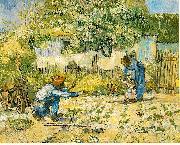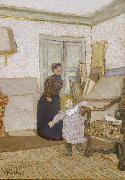Wholesale Oil Painting Reproductions No Minimum and Door to Door! |
|||||||||||
|
|
|||||||||||

|
|||||||||||
|
|
|
||||||||
All Vincent Van Gogh Oil Paintings |
||||||||
|
|
||||||||
|
|
||||||||
|
Artist Introduction: Dutch Post-Impressionist Painter, 1853-1890
Vincent Willem van Gogh (30 March 1853 ?C 29 July 1890) was a Dutch Post-Impressionist artist. Some of his paintings are now among the world's best known, most popular and expensive works of art.
Van Gogh spent his early adult life working for a firm of art dealers. After a brief spell as a teacher, he became a missionary worker in a very poor mining region. He did not embark upon a career as an artist until 1880. Initially, Van Gogh worked only with sombre colours, until he encountered Impressionism and Neo-Impressionism in Paris. He incorporated their brighter colours and style of painting into a uniquely recognizable style, which was fully developed during the time he spent at Arles, France. He produced more than 2,000 works, including around 900 paintings and 1,100 drawings and sketches, during the last ten years of his life. Most of his best-known works were produced in the final two years of his life, during which time he cut off part of his left ear following a breakdown in his friendship with Paul Gauguin. After this he suffered recurrent bouts of mental illness, which led to his suicide.
The central figure in Van Gogh's life was his brother Theo, who continually and selflessly provided financial support. Their lifelong friendship is documented in numerous letters they exchanged from August 1872 onwards. Van Gogh is a pioneer of what came to be known as Expressionism. He had an enormous influence on 20th century art, especially on the Fauves and German Expressionists. |
||||||||
|
|
||||||||
|
First Steps Painting ID:: 72384 |
Oil painting reproduction of Vincent van Gogh
cjr |
|||||||
Height Width |
INS/CM Quality |
|||||||
|
X |
| |||||||
|
|
||||||||
All Edouard Vuillard Oil Paintings |
||||||||
|
|
||||||||
|
|
||||||||
|
Artist Introduction: 1868-1940
French
Edouard Vuillard Galleries
Jean-Edouard Vuillard, the son of a retired captain, spent his youth at Cuiseaux (Saone-et-Loire); in 1878 his family moved to Paris in modest circumstances. After his father\'s death, in 1884, Vuillard received a scholarship to continue his education. In the Lycee Condorcet Vuillard met Ker Xavier Roussel (also a future painter and Vuillard\'s future brother in law), Maurice Denis, musician Pierre Hermant, writer Pierre Veber and Lugne-Poe. On Roussel\'s advice he refused a military career and entered the Ecole des Beaux-Arts, where he met Pierre Bonnard.
In 1885, Vuillard left the Lycee Condorcet and joined his closest friend Roussel at the studio of painter Diogene Maillart. There, Roussel and Vuillard received the rudiments of artistic training. |
||||||||
|
|
||||||||
|
|
First Steps Painting ID:: 88601 |
late 1890s
Medium Oil on canvas
Dimensions 51.8 x 36.5 cm
cjr |
||||||
Height Width |
INS/CM Quality |
|||||||
|
X |
| |||||||
|
|
||||||||
|
Prev Next
|
||||||||
|
|
||||||||
|
Related Paintings to Edouard Vuillard :. |
||||||||
|
|
||||||||
|
CONTACT US |


